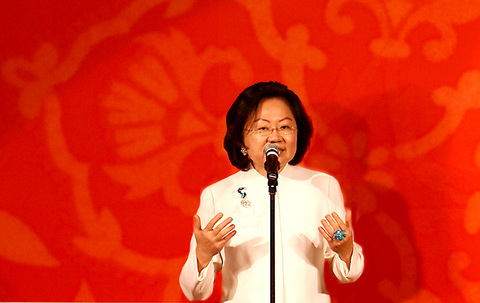The National Chiang Kai-shek Cultural Center (CKS Cultural Center) is turning 20 this year, and to celebrate the center will hold a series of performances by local and international acts at the National Theater and National Concert Hall. The center will also hold a 20-year retrospective on the evolution of Taiwan's foremost venue for the arts.
The Classic 20 series brings to the stage international heavyweights including Robert Wilson, Philip Glass and Tadashi Suzuki and musical performances by Bavarian Radio Symphony Orchestra and The German Opera of the Rhine. Performances by local groups will include Cloud Gate Dance Theater (雲門舞), Yang Li-hua Taiwanese Opera group (楊麗花歌仔戲), Performance Workshop Theater (表演工作坊) and New-Classic Dance Company (新古典舞團).
The retrospective is called Vitality Capsule of Art and will look at the dance, music, theater and opera performed at the NTCH over the past 20 years, with a view to the future.

PHOTO: NOAH BUCHAN, TAIPEI TIMES
"I hope to continue to bring international acts to Taiwan … as well as increase the profile of local artists abroad," said the recently appointed Chairperson for the CKS Cultural Center, Tchen Yu-chiou (陳郁秀), at a press conference on Thursday.
The board of directors elected the former Chairperson of the National Symphony Orchestra (NSO) and minister for cultural affairs to a three-year term.
But if this move is cause for celebration, the departure of Artistic Director, Ping Heng (平珩), leaves somewhat of a gap in the program.
After arriving in 2004, Heng oversaw the transformation of the center from a governmentally run operation to a public corporation. Though this change saw a one-third reduction in government funding for the center, the trade-off came in the fact that management was able to increase its control over content and staff.
With control over programming, Heng managed to increase the number of foreign artists holding workshops and performing in Taiwan. Recent examples include the New Circus performances given in October of 2006 and the recent lecture on the theater given by Robert Wilson in January.
But if Heng no longer works at the CKS Cultural Center, she doesn't plan on retiring. "I want to get back to my [dance] business, which I've neglected since becoming artistic director [in 2004]," she said when asked what she plans to do after leaving the NTCH.
Though programming for the center is the responsibility of Artistic Director, the majority of the performances at the National Theater and National Concert are rentals.
"Over the past three years, 30 percent [of the performances are] our own production and 70 percent are rentals," said Ann Liu (劉怡汝), deputy director of the CKS Cultural Center. This works out to 350 programs — with a total expense of roughly NT$280 million — sponsored by the NTCH, and 650 rentals.
But in terms of costs, the rental figure is slightly misleading as the fee for rentals is 30 percent lower than what it costs the NTCH. Consequently, the NTCH subsidizes the rental space.
The yearly budget to run the four theaters — the Concert Hall (2,000 seats), Recital Hall (350 seats), the National Theater (1,500 seats) and Experimental Theater (180 seats) — is roughly NT$985 million, including maintenance fees.

Taiwan has next to no political engagement in Myanmar, either with the ruling military junta nor the dozens of armed groups who’ve in the last five years taken over around two-thirds of the nation’s territory in a sprawling, patchwork civil war. But early last month, the leader of one relatively minor Burmese revolutionary faction, General Nerdah Bomya, who is also an alleged war criminal, made a low key visit to Taipei, where he met with a member of President William Lai’s (賴清德) staff, a retired Taiwanese military official and several academics. “I feel like Taiwan is a good example of

March 2 to March 8 Gunfire rang out along the shore of the frontline island of Lieyu (烈嶼) on a foggy afternoon on March 7, 1987. By the time it was over, about 20 unarmed Vietnamese refugees — men, women, elderly and children — were dead. They were hastily buried, followed by decades of silence. Months later, opposition politicians and journalists tried to uncover what had happened, but conflicting accounts only deepened the confusion. One version suggested that government troops had mistakenly killed their own operatives attempting to return home from Vietnam. The military maintained that the

Jacques Poissant’s suffering stopped the day he asked his daughter if it would be “cowardly to ask to be helped to die.” The retired Canadian insurance adviser was 93, and “was wasting away” after a long battle with prostate cancer. “He no longer had any zest for life,” Josee Poissant said. Last year her mother made the same choice at 96 when she realized she would not be getting out of hospital. She died surrounded by her children and their partners listening to the music she loved. “She was at peace. She sang until she went to sleep.” Josee Poissant remembers it as a beautiful

Before the last section of the round-the-island railway was electrified, one old blue train still chugged back and forth between Pingtung County’s Fangliao (枋寮) and Taitung (台東) stations once a day. It was so slow, was so hot (it had no air conditioning) and covered such a short distance, that the low fare still failed to attract many riders. This relic of the past was finally retired when the South Link Line was fully electrified on Dec. 23, 2020. A wave of nostalgia surrounded the termination of the Ordinary Train service, as these train carriages had been in use for decades